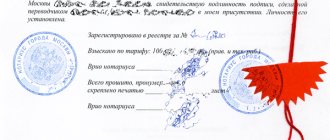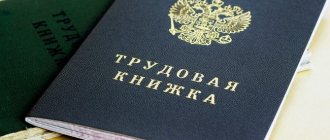VKontakte
Buying a privatized apartment requires certain knowledge and skills. Everyone decides for themselves whether to do this on their own or trust an experienced realtor. If you decide to do it on your own, then first of all check the title documents for the residential premises. These include: a certificate of state registration of rights or an extract from the unified state register of real estate, as well as a foundation document.
Transfer of rights when purchasing a privatized apartment
The sale of a privatized or municipal apartment involves the transfer of ownership of not only the actual square meters, but also the ownership rights to them.
If privatized housing is involved in the purchase and sale transaction, then the new owner becomes the rightful owner of the apartment , which will be in his ownership.
If non-privatized housing is involved in the transaction, then limited ownership rights along with the apartment are transferred to the new owner - he becomes the tenant of the apartment on the basis of a social tenancy agreement.
Is it necessary to privatize the purchased apartment?
Yes, the purchased apartment must be privatized. The main advantage of a privatized apartment, room or share is that it becomes property (what a sample purchase and sale agreement for a share in an apartment between relatives looks like and what documents are needed, read here). As you know, the owner has the right to dispose of his property at his discretion - he can sell it, change it, donate it or bequeath it at his discretion.
It is worth remembering that only privatized housing . If a single owner of a non-privatized apartment dies, then no laws on inheritance of relatives of different lines apply. In this case, the apartment becomes the property of the state .
One of the advantages of privatized housing is that it can act as collateral for a large bank loan. But in this case, it is worth remembering that this fact will be a burden until full payment is made if the apartment is put up for sale. Of course, you can sell it, but not every buyer agrees to take responsibility for paying off other people's bank debts.
In a privatized apartment, the owner has the right to register any persons at his own discretion , without coordinating this issue with representatives of local authorities.
The owner of the property can also, at his own discretion and without additional approval from regulatory authorities, rent out the apartment.
At the same time, he is obliged to pay a tax of 13% to the state on the profit received.
The tax is calculated based on the amount specified in the rental agreement.
According to the real estate tax law that came into force in 2014, home owners are required to pay tax based on its value.
Apartment owners also pay for major repairs of the buildings in which their apartments are located. Before privatization, this expense item was the responsibility of city and municipal authorities. For families with a minimum income, such expenses may become too high.
Right to use residential premises
There is another important point that must be taken into account - a person may retain the right to use residential premises.
That is, both for persons who refused to participate in privatization, and for those who did not refuse, but were simply not included in privatization, the right to use residential premises is retained for life until this person himself refuses it.
Therefore, if there is a person who once did not refuse, but had the legal right to participate in privatization, then he needs to independently write an application for deregistration of the apartment being sold and that he agrees with the termination of his right to use this living space.
If this is not done, then there are much greater risks than just the potential for the privatization deal of the 90s to be challenged.
Is it necessary to privatize an apartment?
The purchased apartment must be privatized at will ; it can also be left in the ownership of the municipality.
The Russian government regularly postpones the end of privatization, and recently a law has been considered to make it indefinite.
Therefore, if citizens are in line to improve their housing conditions, or for some other reason they are using a social rental agreement and are not privatizing their housing, then there is no point in rushing yet.
Non-privatized housing can also participate in sales transactions - it can be exchanged for a larger or smaller area with an appropriate surcharge. Only in this case will an exchange agreement be concluded, since only property can be sold.
Deadlines for filing a claim
Neither the law nor any judicial act clearly states during what period children can file such claims, therefore the general statute of limitations always applies.
The statute of limitations for invalid transactions is currently one year; accordingly, children aged 18 to 19 years can apply; they have the right to file a claim in court to declare the transaction invalid.
Considering that 25 years have already passed since August 1994, there cannot be any more children who have not missed the statute of limitations.
Of course, it can be assumed that, even as an adult, the person did not know that he did not participate in privatization, that he was not the owner of a share of the apartment and had the opportunity to bring such a claim. All this can be taken into account, but then such a person will not only have to prove why the deadline was missed, he must prove that he did not know and could not know that he was not the owner, and also that he was not included in privatization.
In fact, this is quite difficult to implement, and therefore the likelihood of challenging such transactions on this basis is quite low.
But still, if circumstances are discovered that there are adult children who once did not participate in privatization, but had such a right, you can get a statement from them that they have no complaints about the fact that they once did not participate in privatization.
In essence, this statement does not have any weight, since no statements can deprive a person of the constitutional right to go to court, but, at a minimum, this statement leads to the fact that there will be confirmation that the person is aware of privatization and that he had the right use it, that is, to confirm the running of the limitation period.
How to buy?
Next, consider a scheme that will help you purchase a privatized apartment:
- Buyers decide on the choice of apartment;
- A preliminary advance or deposit agreement is concluded with the seller, where he provides the documents necessary for verification and conclusion of the transaction, the timing of the transaction is agreed upon, and the final cost is agreed upon (read about the preliminary agreement for the purchase and sale of an apartment in this material);
- The documents of the apartment owners and documents for the apartment itself are checked;
- The purchase and sale agreement is drawn up and carefully checked by both parties;
- Meeting to sign an agreement and deposit money in a safe deposit box (today this method of transferring money is the safest);
- The signed documents are submitted for registration to the Registration Chamber, where both parties to the transaction receive a receipt for receipt of the documents and an indication of the deadline for their receipt;
- At a certain time, the parties or their representatives take away the registered documents;
- The parties sign the Acceptance and Transfer Certificate of the apartment in accordance with the purchase and sale agreement.
Documents for purchasing an apartment
To complete the transaction, both parties must provide certain documents.
Buyers are required to:
- Valid passports;
- Marriage certificate (if buyers are married);
- Notarized declaration that the buyer is not married (if he is not married);
- Notarized power of attorney and passport of the buyer's representative (if the transaction is concluded on behalf of the buyer by his representative).
In order for a buyer to buy a privatized apartment, the seller must provide the following documents:
- Valid passports of all sellers;
- Originals of title documents;
- The registration certificate of the premises, which is issued by the BTI and is valid for 5 years from the date of issue;
- Unified Housing Document, which includes a certificate of absence of debts on utility bills, an extract from the house register and a copy of the financial and personal account;
- IPA and ND certificates;
- Notarized consent of the spouse, if the apartment was purchased during marriage;
- If one of the owners is a minor, then the consent of the guardianship authorities to carry out the transaction (we talked about the sale of an apartment with minor owners here);
- If his representative acts on behalf of the seller, then a notarized general power of attorney in his name;
- Extract from the Unified State Register. But this document is usually ordered by the buyer himself in order to make sure that the seller really is the owner at the time of the transaction.
Documentation
It is necessary to collect documents, prepare a purchase and sale agreement and register the transaction with the MFC. Such documents include:
- Owners’ passports or other identification documents of sellers. For minor children (under 14 years of age), birth certificates are required.
On June 2, 2021, a law came into force according to which all transactions for the sale of an apartment with shares are executed only through a notary (Federal Law dated June 2, 2016 No. 172). If the apartment is owned or jointly owned, then you can draw up a purchase and sale agreement yourself. - Title documents for the apartment. These include: a certificate of state registration of rights or an extract from the unified state register of real estate, as well as a privatization agreement. Notarized consent of the spouse is not required when selling a privatized apartment.
- Certificates from the Housing Office. From a passport specialist you can order an extract from the house register, which contains information about all registered persons. A certificate is obtained from the accountant indicating that there are no debts on utility bills. The owner must also provide a receipt for payment for major repairs.
Important! If the apartment was acquired by the seller as a result of privatization, then all registered persons not participating in the transaction must sign out of it.
Add. mortgage documents
- Extract from the Unified State Register of Real Estate. In a notarial transaction, this document is ordered by a notary, but in a mortgage transaction, the bank’s credit manager can order it or ask you to do it yourself.
- Technical passport or description of the apartment. This document will be required to draw up an assessment, as well as to check the apartment for the absence of illegal redevelopment. Ordered from BTI.
- Estimation of the cost of the apartment. When purchasing an apartment with a mortgage loan, the bank will require an assessment of the property being purchased. The apartment will be pledged to the bank until you repay the mortgage.
These documents are quite sufficient to draw up a purchase and sale agreement and register the transaction.
Privatization of the purchased apartment
If citizens have purchased a non-privatized apartment, they can register it as their property on the basis of a social tenancy agreement, which will be concluded with local authorities after the acquisition.
Any family members registered in the apartment on the basis of a social tenancy agreement and who have not previously participated in privatization can participate in the privatization of a new apartment.
The privatization process in this case is no different from the usual standard procedure. A standard package of documents is also required. Owners may be refused privatization due to large debts for utilities and housing and communal services. Therefore, you should not accumulate unsustainable debts, otherwise it will simply not be possible to privatize the apartment.
If an apartment is purchased with a large existing debt (this is also possible), then the new owners planning to privatize it after the purchase should take this fact into account when purchasing.
Changes in legislation
In the Law of the Russian Federation “On the privatization of housing stock in the Russian Federation” No. 1541-1 of 1991, there were indeed no provisions that would oblige the inclusion of minor children among the owners.
In 1994, appropriate changes were made to this law, however, from 1991 to 1994, a fairly large number of apartments were privatized, while the minor children registered in them did not participate in the privatization.
The Supreme Court of the Russian Federation has already clarified on this matter quite a long time ago that, despite the fact that the law changed only in 1994, the rights of children still cannot be violated, and if children were registered in the apartment, but did not participate in privatization, their rights remain the right to recognize the transaction as invalid in this part and to recognize ownership of a share in this apartment.
Risks when buying a privatized apartment
The most important risk in an apartment purchase and sale transaction is the possibility of the transaction being declared void . This may arise in the event of third party rights to this apartment, namely:
- If one of the co-owners of the apartment is a minor , and the consent of the guardianship authorities was not obtained when concluding the purchase and sale transaction.
- If one or more family membersselling an apartment did not participate in privatization and did not give their written consent (in this case, both the privatization itself and subsequent transactions made with the apartment may be considered void).
According to statistics, violation of the rules of privatization and the rights of persons participating in it is the most common reason for declaring real estate transactions invalid.To eliminate such risks, you need to check the history of the apartment for the people registered in it , their age and degree of relationship at the time of privatization.
In all cases where a real estate transaction is declared invalid, the buyer who last bought such an apartment will suffer. Therefore, when buying, you should not rely only on the honest word of the sellers; you need to independently and carefully check the entire history of the apartment and its documents .
Read about the risks of the seller and the buyer when buying an apartment here.
What documents are needed to sell a privatized apartment?
The list of documents for the transaction will depend on whether you are a Seller or a Buyer. How so? Isn't it the same for both?
The fact is that the Seller, in order to sell his privatized apartment, needs the very minimum of documents necessary only to register the transfer of ownership.
But the Buyer (if he is a reasonable person) will require additional documents from the Seller in order to find out some details that will reduce the risk of the transaction being declared invalid.
Total, list of documents for the purchase and sale transaction of an apartment (including privatized):
- from the position of the Seller - see the INSTRUCTIONS for the Seller at this step
- from the Buyer's position - see at this step .
For the same reason, the terms of the Apartment Sale and Purchase Agreement must be monitored by the Buyer much more carefully than by the Seller. In particular, the conditions for the removal of all residents from the apartment, the conditions for cash settlements in the transaction, the conditions and terms for the physical transfer of the apartment, etc.
A sample Purchase and Sale Agreement for a privatized apartment can be downloaded HERE (SERVICES).
Tax on the sale of a privatized apartment
What tax will the Seller have to pay on the sale of a privatized apartment?
Here the tax amount will depend on the period of ownership of the apartment, i.e. from the period from the moment of its privatization to the moment of its sale. If the Seller owned the apartment for more than 3 years , then he is completely exempt from paying tax.
If the Seller owned the apartment for less than 3 years , then when selling it he will be required to pay personal income tax of 13% .
From what amount this tax is calculated and how it can be reduced by applying a tax deduction is described in a separate Glossary article at the link.
How do alternative transactions with apartments take place? What is the procedure there? – see the link.
Check what?
Purchasing a privatized apartment may carry risks of recognizing the transaction as void and they should be minimized. To do this you need:
- Check documents on privatization and its transparency;
- Clarify the composition of the family and all co-owners of the apartment - whether there are any minor children among them, and whether all owners give their voluntary consent to the sale;
- If the seller is married, you need to check the period of purchase or privatization of the apartment . If at this moment the owner was married, then he must obtain the notarized consent of his spouse to sell the apartment;
- In order to ensure the adequacy of the seller, you should ask him to present a certificate from a drug and neuropsychiatric dispensary ;
- The seller’s passport is also subject to verification - it must be without inscriptions, extraneous stickers or inscriptions and correspond to the validity period;
- You need to check the documents for the ownership of the apartment , and not just the certificate.
The main document is the document on the basis of which the certificate is issued. This could be a purchase and sale agreement, a will or deed of gift, privatization, etc.
What documents to check
When concluding a purchase and sale transaction, you will need to check or complete a lot of paperwork. All of them can be divided into several main categories:
- personal;
- for an apartment;
- on payment of housing and communal services and repairs;
- about persons registered in the apartment.
Everything must be checked - there are no trifles here. It is clear that the methods and thoroughness of the verification must be different, but we still recommend entrusting this to lawyers who thoroughly understand the issue.
Personal documents
Of these, the seller is first required to provide a passport. It should not contain any extraneous stickers or inscriptions, it should have an unexpired validity period. The passport can be checked on the website of the Main Directorate of the Ministry of Internal Affairs for Migration Issues using a special service, or better yet, by contacting the local passport office.
In addition, in order to ensure that one of the parties to the transaction is declared incompetent, it is required to undergo an examination and obtain a certificate of health. If the seller is already elderly, it is better not to get by with just a certificate, but to invite a doctor directly to the transaction so that he confirms that he is legally competent immediately upon signing it.
If the sale is carried out through a representative, you need a notarized power of attorney from the seller for him. At the same time, it is still worth asking for a personal meeting with the owner in order to ensure his fundamental consent to the transaction, and issues of a technical nature should be resolved with the trustee. If the meeting fails, this is a reason to check everything again.
For an apartment
The technical and cadastral passports of the apartment must be checked; it is worth making sure that no illegal redevelopment has been carried out in it, by checking the plan with the premises itself. It should be borne in mind that the new owner will have to answer for illegal redevelopment, and you may then be required to pay a fine or even return the home to its original state at your own expense. And even if not, you will have to deal with the design of the redevelopment.
If previously the most important document was a certificate of ownership, now whether the seller owns the rights to the apartment, and whether there are other owners, can be checked by ordering an extract from the Unified State Register of Real Estate Rights - and if problems are found, then they are necessary in any case decide before selling.
It is necessary to check the document on which the seller’s ownership is based - this could be a purchase and sale agreement, a deed of gift, or a privatization agreement. They contain details regarding the fact that other citizens can also claim housing rights. Naturally, you should carefully study both their appearance - so, all corrections in the text must be separately certified by signatures, there should be no erasures or other things - as well as the content. The title deed may contain mandatory conditions, failure to comply with which will result in the transaction being terminated - you need to make sure that they are met. Otherwise, the second party to the previous transaction, showing up after the purchase of the apartment, can get it canceled through the court.
If the extract from the Unified State Register shows that the apartment constantly changed hands, this is a reason to be wary.
It also makes it clear whether any arrests have been made recently, whether there have been any lawsuits surrounding her, and the like. It is best if there have been no transactions or disputes related to the apartment within the last three years - since this is the statute of limitations, this will certainly protect against claims.
The apartment may not be listed in the Unified State Register - this means that there have been no previous transactions with it. It is worth submitting a request about it to the local Department of Housing Policy and, if the seller’s rights are confirmed, this means that it is legally clear.
About payment of housing and communal services and major repairs
The absence of utility debts will be evidenced by the Unified Housing Document. According to the acceptance certificate, a certificate of absence of debt must be presented, as well as payment receipts.
About registered persons
Another function of the Unified Housing Document is that it carries the functions of an extract from the house register. Accordingly, if, according to this document, the seller is married, and was married when he privatized the home, he will need the consent of the spouse certified by a notary to sell it. If there is a minor among the owners, the consent of the guardianship authorities will also be required.
Conclusions about buying an apartment, privatization
Buying an apartment is a very responsible matter , which contains many nuances and pitfalls. There is a single scheme for purchasing a home, but each individual case is completely individual.
For each specific transaction, certain documents or procedures may be required that are not indicated in the list. For example, if the seller is a very elderly person, then medical certificates alone will not be enough. Sometimes it may be necessary to have a doctor present at the transaction, who will document the seller’s legal capacity at the time of the transaction.
This is necessary, first of all, for buyers, so that later the heirs or relatives of the seller do not have the opportunity to challenge the concluded transaction.
And in order to protect yourself as much as possible when buying an apartment, you should seek help from specialists - lawyers or realtors who deal with real estate issues professionally.










